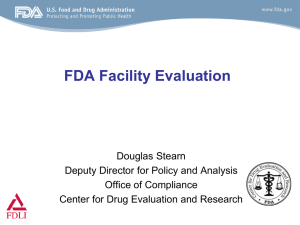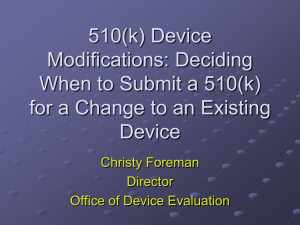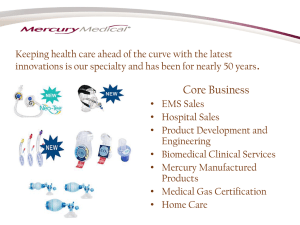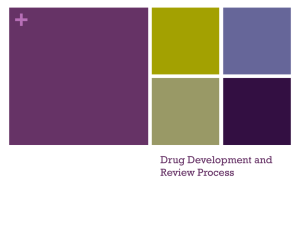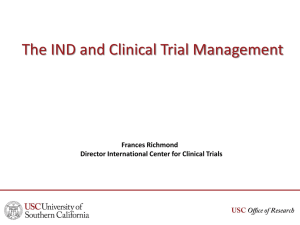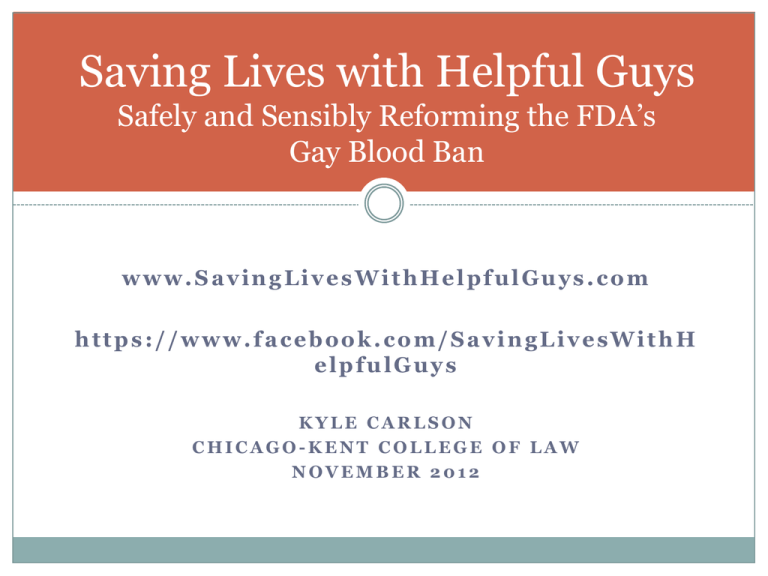
Saving Lives with Helpful Guys
Safely and Sensibly Reforming the FDA’s
Gay Blood Ban
www.SavingLivesWithHelpfulGuys.com
https://www.facebook.com/SavingLivesWithH
elpfulGuys
KYLE CARLSON
CHICAGO-KENT COLLEGE OF LAW
NOVEMBER 2012
Blood Donation
Regulation
FDA
Sub-Agency within Health and
The Agency
U.S. Food
and Drug
Administration
(FDA)
Human Services
FDA’s Center for Biologics
Evaluation and Research (CBER)
Regulates U.S. collection of blood
and blood products
Responsible for ensuring the
safety of the blood supply
Regulates blood donation, storage
Technical standards, inspections,
enforcement, recordkeeping
2
The Role of the FDA
“While a blood supply with zero risk of transmitting infectious
disease may not be possible, the blood supply is safer than it has
ever been. [B]iological products, blood and blood products are
likely always to carry an inherent risk of infectious agents.
Therefore, zero risk may be unattainable. The role of FDA is to
drive that risk to the lowest level reasonably achievable without
unduly decreasing the availability of this life saving resource.”
– FDA Website March 2011
3
Blood Facts
Shelf Life –
Red Cells at 6ºC for up to 42 days
Platelets at room temperature in up
Need for Donation
Blood Banks and
the Public Welfare
to five days
Plasma stored in freezers for up to
one year
Need –
Needed every two seconds in U.S.
About 1 in 7 people entering a
hospital needs blood
Blood is always needed for
treatment of accident victims, cancer
patients, hemophiliacs and surgery
patients
Blood cannot be manufactured or
harvested
4
Blood
Shortages
Recommended: 3-Day Supply
Shortages –
Shortages of all blood types
Need for Donation
Reoccurring Drops
Below 2-Day, Even
1-Day Supplies
happen during the summer and
winter holidays
Large Percentage of Donations
from Schools
If only one more percent of all
Americans would give blood,
blood shortages would disappear
for the foreseeable future.
5
Blood
Shortages
Major Hospitals Forced to
Coping with
Shortages
Emergency
Preparedness,
Fiscal Costs, and
Public Welfare
Postpone All Elective Surgeries
Certain Blood Types Restricted to
Emergency Use Only
Disasters and Terrorism – Blood
Must Be Already “On-Shelf”
Pandemic Fears Reduce Donors –
Mad Cow, West Nile, Swine Flu
Import Blood from Other States
Aging Population More Demand:
Changing Youth Behavior and
Donor-Drive Marketing Costs
6
America’s Blood Centers: Nov 28, 2012
½ US Volunteer Blood Supply: % 1 Day Supply
7
America’s Blood Centers: Nov 28, 2012
½ US Volunteer Blood Supply: % 2 Day Supply
8
Some Recent Blood Supply Shortages
•July 2000 – The majority of American Red Cross (ARC) blood service regions
are operating with less than one day's supply of blood. "A blood shortage is a
disaster, and we need the same level of public support for this disaster as we do for
a hurricane, tornado, flood, or fire"
•September 2000 – “This is a critical shortage ... one of the most serious we
have ever seen” ARC
•August 2001 – “For the first time, the federal government is starting a day-today tracking system to monitor the nation's blood supply and sound an alarm
when shortages loom. It comes none too soon.”
•September 2002 – The nation's hospitals have insufficient blood reserves to
respond to a major national disaster, the country's largest blood suppliers warned
•January 2003 – Hospitals and community blood banks across the nation are
experiencing a blood shortage so severe that some are postponing non-emergency
surgeries and thawing frozen blood, a measure that makes it more perishable.
''Some hospitals have only a one-day supply. About 50 percent have less than two
days,'' American Blood Centers (ABC)
9
Some Recent Blood Supply Shortages
•January 2004 – The U.S. Department of Health and Human Services is calling
for blood donations claiming the nation is facing a critical blood shortage. Health
and Human Services Secretary Tommy Thompson says 'If blood supplies do not
immediately increase, patients, accident victims and those whose lives depend on
regular transfusions are at risk for not getting the blood they need.'
•August 2005 – "If the gasoline supply dropped to one and a half days as people
headed out to enjoy the Labor Day weekend America would consider that a crisis we want people to be just as concerned about the blood supply” ARC
•Summer and Fall 2007 – the extreme seasonal drought that is leading some
experts to question the growing list of safety criteria for blood donors. Sixty six
million Americans are excluded from donating blood based on a list that some
doctors call overly restrictive. The figure, recently calculated by researchers at the
University of Minnesota, represents more than a third of adult Americans who
would otherwise be eligible.
• January and February 2011 – Snowstorms: The Red Cross reported at the
end of January that blood levels for this time of year were the lowest in ten years.
10
Current Blood
Donation
Guidelines
The Motivation
Pandemic Panic
Present Ban: 1983, Final V: 1985
Response to HIV/AIDS Crisis
Emergency Measure
Transfusion Risks Discovered
Devastated Sub-Populations:
MSM and Hemophiliacs
MSM = Men Who Have Sex with
Men (behaviorally defined)
FDA: MSM “Permanent Deferral”
Blood Collection Agencies Must
Adhere to FDA Guidelines
11
Current Blood
Donation
Guidelines
Donation Process
Intake
Questionnaires
“Self-Deferral” Process
Inform donors about the risk of
transmitting infectious diseases.
Ask potential donors questions
about their health and certain
behaviors and other factors (like
travel and past transfusions) that
increase their risk of infection.
Help people, even those who feel
well, to identify themselves as
potentially at higher risk for
transmitting infectious diseases.
Reduce unknowing donation of
possibly infected blood.
12
The Intake Question
Question 35: (Male Donors) From 1977 to the present, have
you had sexual contact with another male, even once?
Response:
No Next Question.
Yes Defer Donor Indefinitely.
13
Can the patient choose?
PROBLEMS
No. Patients not informed of
Self-Deferral
Gay Blood Ban
Actually Filtering
out MSM?
viable gay blood donors lack
opportunity to decide if they are
willing to accept the donation
Ineffective
MSM Lie: outing, personal affront
Definitions: “sexual contact”
Blood Banks National “Deferral
Registry” – No Reason Codes or
Statistical Analysis
14
Better Testing: Antibody + Virus,
PROBLEMS
Scientific Progress
Gay Blood Ban
Failing to Add
Safety Value
Nucleic Acid Amplification
HIV “Window Period” Reduced
from Months to Weeks or Less
Donor Knowledge: “Rapid” and
“At-Home” HIV Testing Available
Automated Quarantine Areas for
New Blood – Prevent Mix-Ups
Increased FDA Blood Bank
Inspections (2 yrs or less)
FDA’s Increased Quality Stds. –
Similar to Pharma Mfg.
15
HRC’s 2000 Est. U.S. 18+ Gay &
PROBLEMS
Gay Blood Ban
Costs
MSM Blood
Unavailable –
Shortages
Lesbian Pop.: 10.5 million of 210
million (limited data)
Williams Inst. – Est. 7.17 Million;
Lifting Ban +219,200 Pints/Yr
ARC Donations – 80% Mobile Blood
Drives (community orgs, companies,
schools, colleges, places of worship
or military installations)
ARC Donations – 20% Schools and
Colleges
Trend: College Anti-Discrimination
Policies + Student LGBT Solidarity
vs. Donation Drives
16
Some Other Permanent Deferrals:
PROBLEMS
1) IV Drug Users,
2) Animal Tissue Transplants,
Social Stigma
Does FDA Think
Gay Blood = Dirty
Blood?
3) Geographic Risk of Malaria or
vCJD/Mad Cow, and
4) Sold Sex for Drugs/Money
MSM Ban Not Focused on Unsafe
Behavior
E.g. Hetero, unsafe sex with sex
worker not permanently deferred
Vs. Monogamous/Widowed MSM
17
FDA Official
Response
March 2006 – FDA Workshop
Wide Array of Views Solicited
FDA Disagreed with Medical
Review of Policy
No Change
Majority
Used 1 Risk Study to Justify
AABB: “Much of the [FDA’s
MSM] data comes from STD
clinics, so they come from people
who have the most promiscuous
MSM behavior”
FDA Risk Model Based on
Inaccurate 1990s Data Before
Blood Bank Safety Reforms
18
HHS Official
Response
Obama Era
June 2010 HHS Committee Upheld
Review of Policy
No Change,
Acknowledge
Weaknesses
Ban Voting 9-6
Acknowledge Ban “Suboptimal” –
Ban Allows “some potentially high
risk donations while preventing
some potentially low risk donations”
Supported Ban: Hemophiliacs,
American Plasma Users Coalition,
Family Research Council, etc…
14-0 Vote to Move Towards
Behavior-Based Q/A
But Recommend Further Study and
Set No Timeline
19
HHS Official
Response
https://federalregister.gov/a/2012
Alternatives
Examined
Public Comment,
Focus on Medical
Community
6091
HHS designing a pilot study
Major Goal: Avoid “Window Period”
Subset of MSM donate blood,
probably 1- or 5-yr abstinence
(a) Pre-donation Donor Testing, (b)
Post-Donation Testing, (c) Combined
Pre-Donation and Post-Donation
Critique: Stigma from Separate
Process, Assumes Donor Honesty,
Ignores Hetero HIV+ Risk
HHS’s Fear?: Behavioral, Risk-Based
Questionnaire Offend Current Donors
Shifting
Constitutional
Law
Obama Lifted HIV+ Travel and
Obama and DOMA
LGBT Protected
Class Status
Likely?
Immigration Bans
Obama Believes DOMA
Unconstitutional
US DOJ to Stop Defending
DOMA in Court, Though Still
Enforced
Argued for Heightened Scrutiny –
Something Like Intermediate i.e.
Similar to Gender Classifications
Circuit Splits on Appropriate
Level of Scrutiny
SCt to announce LGBT case
reviews Nov 30, 2012
21
Shifting
Constitutional
Law
Past Cases: No “Right to Donate”
Future: Cause of Action Under 14th
Lack of Change
Will Cost FDA
Costly Studies vs.
Costly Litigation
Amend, Equal Protection Clause
Disparate Impact Gov’t Action +
Discriminatory Intent
Intent may be inferred from, e.g.,
“irrationality” of classification
Mere Rationality: Legitimate End +
Rational Means
Intermediate : Important Interest +
Substantially Related Means
Strict: Compelling Interest +
Narrowly Tailored Means (i.e. No
Less Restrictive Options)
22
Costs, Win or Lose EP Suit:
Staying Out of
Court
Results of EP Suit
Nobody Wins
Resources Wasted in Defense
P.R. Problems, esp. with younger,
target donor demographic
Grows Divide Between Regulator
and Regulated (blood banks,
hospitals, medical professionals)
Additional Cost – FDA Loses:
Judicial Control of Reform
Additional Costs – FDA Wins:
Fails to Address Blood Shortages
and Behavioral Risk Factors
23
Proposing Solutions:
Short-Term Deferral
LOW-RISK OPTIONS,
INTERNATIONAL EXPERIENCE, AND
THE EMERGING MEDICAL
CONSENSUS
Options:
5-Yr Deferral
1-Yr Deferral
Williams Inst. –
5 Yr Deferral = 89,700 Pints/Yr
1 Yr Deferral = 71,200 Pints/Yr
FDA Data –
Proposed
Alternatives
5 Yr Deferral = Zero Window Period
Arbitrary Period,
But Safe
and Up to 1.7 Accidental Releases
1 Yr Deferral = 3 Window Period and
3 Accidental Releases
Similar Risk Scenarios –
MSM Tissue Donation = 5 Yr
Hepatitis B and C “Window Period”
Result in Temporary, 1 Yr Deferrals
25
More Effective
Intake
Questions
Behavioral Risk Assessment –
Risk-Based
Deferral
Dropping
Arbitrary Deferral
Periods, Increasing
Overall Safety
Monogamy vs. Unprotected Sex,
Numerous Partners
Apply Equally to Heterosexuals
and Homosexuals
HIV/AIDS No Longer the “Gay
Disease” – esp. African Americans
Ask Time of Last HIV/AIDS Test
– Window Period of Weeks
Wouldn’t Violate Schools’ AntiDiscrimination Language
(significant blood source)
26
International
Experience
Lifted Ban – Russia
Intake Questions Target Risky
Proven Success
Decrease Stigma,
Increase Safety
Behavior – Spain, Italy, Thai Red
Cross
Spain’s HIV Transfusions Drop!
6 Month Deferral – South Africa
Considerations
Demographics of
HIV Vary
1 Year Deferral – Sweden, Brazil,
Argentina, Australia, Japan, and
Hungary
5 Yr Deferral – New Zealand
27
Building
Support for
Reform
Jump on the
Bandwagon
The Blood Banks
and the Medical
Community
2006 ARC, AABB, and ABC –
“scientifically and medically
unwarranted”
2010 ARC: “We strongly support the
use of rational, scientifically-based
deferral periods that are applied
fairly and consistently among
donors who engage in similar risk
activities.”
2010 AABB: “You wonder, if this
wasn’t about gay men, would the
rules be applied in the same way?”
2010 AMA – 5 Yr Deferral Policy
28
Building
Support for
Reform
August 2009
Jump on the
Bandwagon
2010
Local and State
Resolutions
CA Assembly Judiciary
Committee Resolution
New York City Council
Washington D.C. City Council
Chicago City Council
San Francisco
29
Building
Support for
Reform
Jump on the
Bandwagon
National Elected
Officials
FDA and HHS Letters – Partial Listing
2010 Senate: John Kerry, Kirstin
Gillibrand, Dick Durbin, Daniel Akaka,
Sheldon Whitehouse, Sherrod Brown,
Frank Lautenberg, Bob Casey, Bernie
Sanders, Russ Feingold, Mark Udall, Al
Franken, Maria Cantwell, Carl Levin,
Tom Harkin, Mark Begich, Rolland
Burris, Michael Bennet
2010 House: Mike Quigley, Diane
Watson, Tammy Baldwin, Jared
Polis, Barney Frank, Anthony Weiner,
Jerrold Nadler, Sam Farr, Michael
Honda, Debbie Wasserman Schultz,
Raul M. Grijalva
30
Building
Support for
Reform
Gay Men’s Health Crisis – Major
Jump on the
Bandwagon
LGBT Civil Rights
Supporters
Study
National Gay and Lesbian Task
Force
Human Rights Campaign
Lambda Legal
The Advocate Magazine
State and Local Human Rights
Commission Complaints and
Settlements
www.SaveALifeMovie.com
31
Building
Support for
Reform
Jump on the
Bandwagon
LGBT Civil Rights
Supporters
Some College and University Boycotts
and Significant Protests
2007 Iowa State University
2008 Sonoma State University
2008 San Jose State University
2010 Keene State College
Ohio LGBT-Affirming Churches
http://www.gaypeopleschronicle.com/s
tories05/august/0826053.htm
Lost Donations = LGBT + Allies
PR Disaster, Young Demographic
Target Donors
32
Building
Support for
Reform
Public Education
Campaign
What You Can Do
Petitions: www.Change.org - ID
Medical Community Signatories and
Public Officials
Targets: HHS, FDA, HHS/FDA
Congressional Oversight Committees,
Previous Elected Signatories,
Links to Advocacy Websites/LGBT
Group Studies,
Ask Eric Holder/DOJ to Clarify Position
on FDA’s Guidelines
Emphasize Blood Bank Worker Support
http://savingliveswithhelpfulguys.com
Model Petition for School Blood Drives
– Do NOT Refuse to Donate!
Model Op-Ed Letter
REPORT SUCCESSES! – Email Me!
33
Marketing and Messaging – Tactics
Growing shortage crises due to demographics
Reduced donations outside of directly affected MSM
Disaster/Terrorism preparedness: “on-the-shelf”
Emphasize safety advances, science, oversight and
operating practices
Blood Bank & Medical Community Consensus
Behavioral Risk Assessment Questionnaire –
Internationally Proven Strategy
Ban Costs: PR (esp. w/ target donor demographic),
Discrimination Settlements, Future Litigation w/
Protected Class Status = Judicial Control of Reform
34
Marketing and Messaging –
Slogans/Themes
Saving Lives with Helpful Guys
It’s Time: Ending the Gay Blood Ban
Not Dirty: Gay Blood and the National Blood Shortage
Dirty Stigma, Clean Blood: Reforming the Gay Blood Ban
Ready to Serve: Reforming Gay Blood Donations
Moving Forward to Save Lives – Reforming the Gay
Blood Ban
Who’s Afraid of Saving Lives? Challenging the FDA’s Gay
Blood Ban
Inertia and Misconceptions
Addressing the Wrong Emergency: AIDS Fears vs.
Medical Realities (need for blood)
35
References
1. The Role of the FDA –
http://www.fda.gov/BiologicsBloodVaccines/BloodBloodProducts/default.htm
2. Blood Product Shelf Life - http://www.redcrossblood.org/learn-aboutblood/what-happens-donated-blood
3. Blood Need – http://www.americasblood.org/go.cfm?do=Page.View&pid=5
4. ABC Supply Charts –
http://stoplight.americasblood.org/plsql/ecat/supply_monitor_pkg.web_repo
rt (accessed Feb. 24, 2011).
5. Intake Questionnaire Procedure – “What is Self-Deferral?”
http://www.fda.gov/BiologicsBloodVaccines/BloodBloodProducts/Questionsa
boutBlood/ucm108186.htm
6. Intake Question #35, Version.1.3, May 2008 –
http://www.fda.gov/biologicsbloodvaccines/bloodbloodproducts/approvedpro
ducts/licensedproductsblas/blooddonorscreening/ucm164185.htm
7. History of Gay Blood Ban – Gay Mens Health Crisis Report, A Drive for
Change: Reforming U.S. Blood Donation Policies (2010)
8. 80% ARC Collection - http://www.givelife2.org/sponsor/quickfacts.asp
9. Deferred Donor Registry - http://www.pptaglobal.org/program/deferral.aspx
References
1. FDA Blood Safety –
http://www.fda.gov/BiologicsBloodVaccines/BloodBloodProducts/default.htm
2. Advocate – FDA’s MSM Data Wrong + Spain’s Transmission Reduction After
Reform: http://www.advocate.com/printArticle.aspx?id=98974
3. FDA Risk Models Faulty – June 9, 2010 Representative Quigley Letter to FDA;
See Anderson et al. in Transfusion (2009; 49: 1102-1114)
References – Blood Supply Shortages
1. Shortages – http://www.americasblood.org/go.cfm?do=page.view&pid=12
2. Shortages – news articles list of the various years elective surgery has been
postponed
3. Shortages – Terrorism/Major Disaster
http://pqasb.pqarchiver.com/latimes/access/171352671.html?dids=171352671:
171352671&FMT=ABS&FMTS=ABS:FT&type=current&date=Sep+11%2C+200
2&author=EDDY+RAMIREZ&pub=Los+Angeles+Times&desc=A+YEAR+AFT
ER%3B+Blood+Shortage+Seen+for+National+Disaster%3B+Health%3A+Red
+Cross%2C+other+suppliers+urge+Congress+to+help+build+up+reserves.&p
qatl=google
4. Shortages – Aging Demographics Change Behavior and Marketing Costs
http://www.pbs.org/nbr/site/onair/transcripts/070927c/ AND
http://www.usatoday.com/news/health/2004-09-23-blood-usat_x.htm
5. Amount of Gay Blood Available – Naomi Goldberg and Gary Gates, Effects of
Lifting Blood Donation Bans on Men Who Have Sex with Men, The Williams
Institute UCLA School of Law (June 2010)
6. Schools Rebuffing Discriminatory Blood Drives:
http://www.sgn.org/sgnnews38_20/page1.cfm;
http://www.cob.sjsu.edu/osland_a/Spring2010/Campus-Blood-Drive-
References – List of Blood Shortages Slide
•July 2000 –
http://findarticles.com/p/articles/mi_m0FSL/is_3_72/ai_65539092/
•September 2000 – http://articles.cnn.com/2000-0919/health/blood.shortage.02_1_elective-surgeries-blood-shortage-america-sblood-centers?_s=PM:HEALTH
•August 2001 – http://nl.newsbank.com/nlsearch/we/Archives?p_product=CS&s_site=thestate&p_multi=CS&p_theme=rea
lcities&p_action=search&p_maxdocs=200&p_topdoc=1&p_text_direct0=0EE338AA797144EF&p_field_direct0=document_id&p_perpage=10&p_sort=YMD_date:D&s_trackval=GooglePM
•September 2002 –
http://pqasb.pqarchiver.com/latimes/access/171352671.html?dids=171352671:171
352671&FMT=ABS&FMTS=ABS:FT&type=current&date=Sep+11%2C+2002&aut
hor=EDDY+RAMIREZ&pub=Los+Angeles+Times&desc=A+YEAR+AFTER%3B+
Blood+Shortage+Seen+for+National+Disaster%3B+Health%3A+Red+Cross%2C
+other+suppliers+urge+Congress+to+help+build+up+reserves.&pqatl=google
References – List of Blood Shortages Slide
•January 2003 – http://nl.newsbank.com/nlsearch/we/Archives?p_product=SJ&s_site=mercurynews&p_multi=SJ&p_theme
=realcities&p_action=search&p_maxdocs=200&p_topdoc=1&p_text_direct0=0F899F7A01352EA3&p_field_direct0=document_id&p_perpage=10&p_sort=YMD_date:D&s_trackval=GooglePM
•January 2004 – http://www.life.com/image/2873838
•August 2005 –
http://www.naturalnews.com/011315_blood_Red_Cross_college.html
•Summer and Fall 2007 –
http://www.reuters.com/article/2007/09/10/idUSN06426222
• January and February 2011 – Nationwide Bad Weather
http://www.accuweather.com/blogs/news/story/45539/winter-weather-leads-tonation.asp?partner=accuweather AND
http://www.redcrossblood.org/news/missouri-illinois/winter-storm-causesblood-supply-shortages-many-states
References – Constitutionality & Legal Views
1. D.C. Human Rights Commission Settlement:
http://www.thebody.com/content/art13321.html?ts=pf
2. Law Review Articles – John Culhane, Bad Science, Worse Policy: The
Exclusion of Gay Males from Donor Pools, 24 St. Louis U. Pub. L. Rev. 129
(2005).
3. Adam Pulver, Gay Blood Revisionism: A Critical Analysis of Advocacy and
The “Gay Blood Ban”, 17 Law & Sexuality 107 (2008).
4. Jay Zitter, Liability for Donee's Contraction of Acquired Immune Deficiency
Syndrome (AIDS) from Blood Transfusion, 64 A.L.R.5th 333 (Originally
published in 1998).
5. Michael Belli, The Constitutionality of the “Men Who Have Sex with Men”
Blood Donor Exclusion Policy, 4 J. L. Society 315 (2003).
6. Daniel J. Penofsky, Transfusion-Associated AIDS Litigation, 58 Am. Jur.
Trials 1 (Originally published in 1996; Updated April 2010)
References – 2006 and 2010 Reviews
1. HHS 2010 Review – http://lubbockonline.com/life/2010-06-10/committeecould-change-ban-gay-men; http://www.365gay.com/news/gay-blood-banremains/; http://perezhilton.com/2010-06-14-gay-men-ban-from-donatingblood-upheld; http://www.metroweekly.com/news/?ak=5334;
http://www.nytimes.com/2010/08/03/health/03blood.html?_r=1&pagewant
ed=print



